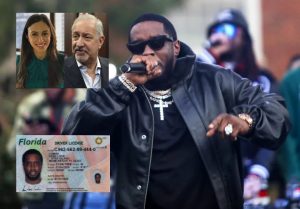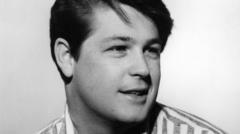Amid heightened scrutiny, Diddy's recent court filing for an insanity defense raises questions about its viability and the implications for the case against him, amid criticism of his legal strategies.
**Diddy's Defense Strategy Sparks Debate: Claims of Diminished Capacity in Criminal Case**

**Diddy's Defense Strategy Sparks Debate: Claims of Diminished Capacity in Criminal Case**
In a provocative legal move, Team Diddy claims Sean ‘Diddy’ Combs suffered from "diminished mental capacity" during alleged criminal acts, igniting mixed reactions across the legal and social spectrum.
Critics say Diddy’s legal team is grasping at straws, with some commentators questioning the soundness of their arguments in light of serious accusations against the music mogul.
In a dramatic twist to Sean ‘Diddy’ Combs’ ongoing legal battles, his legal team has presented a 23-page filing in federal court that argues he exhibited “diminished mental capacity” during the period of alleged drug use and accompanying crimes. The filing, noted as Filing #276, was submitted recently by the U.S. Attorney in New York’s Southern District, and it has incited both intrigue and skepticism within legal circles.
The proposed “insanity defense” has prompted a flurry of commentary, with experts and public figures questioning whether Diddy himself suffers from a lack of sanity or if his legal team is merely trying desperate measures. Critics highlight that this defense approach seemingly overlooks the realities faced by the alleged victims, who were reportedly drugged by Combs and his associates.
From popular perceptions, Diddy is often contrasted unfavorably with his peer Shawn Corey Carter, known as Jay-Z, whom many regard as the “smarter” and “more cunning” figure. In light of Diddy’s current incarceration while Jay-Z remains free, the narrative of injustice persists, as commentators draw lines between both celebrities despite attempts from Diddy’s attorney, Alex Spiro, to delineate their associations.
The government filing further scrutinizes the credibility of the medical expert Dr. Elie Aoun, arguing against his conclusions under the Insanity Defense Reform Act of 1984 (IDRA). The document criticizes Aoun’s testimony for lacking a reliable foundation, stating that his opinions seem based purely on subjective assertion rather than methodical evidence or assessment.
Critics point out that Diddy’s team has been resorting to an array of defenses in their case, labeling this latest attempt as particularly outlandish. Observers compare it unfavorably to a ‘Swingers’ defense put forth just the week prior, suggesting that Diddy's attorneys may simply be floundering for a compliant narrative amidst an adverse climate.
The press continues to cover how the defense strategy, which previously alluded to comparing grave offenses like rape with lesser crimes like tax evasion, seems increasingly desperate in its efforts to challenge evidence against Diddy. While Diddy’s fate remains uncertain, the legal and public discourse surrounding his case intensifies, highlighting the polarizing effect of celebrity culture in serious legal matters.
In a dramatic twist to Sean ‘Diddy’ Combs’ ongoing legal battles, his legal team has presented a 23-page filing in federal court that argues he exhibited “diminished mental capacity” during the period of alleged drug use and accompanying crimes. The filing, noted as Filing #276, was submitted recently by the U.S. Attorney in New York’s Southern District, and it has incited both intrigue and skepticism within legal circles.
The proposed “insanity defense” has prompted a flurry of commentary, with experts and public figures questioning whether Diddy himself suffers from a lack of sanity or if his legal team is merely trying desperate measures. Critics highlight that this defense approach seemingly overlooks the realities faced by the alleged victims, who were reportedly drugged by Combs and his associates.
From popular perceptions, Diddy is often contrasted unfavorably with his peer Shawn Corey Carter, known as Jay-Z, whom many regard as the “smarter” and “more cunning” figure. In light of Diddy’s current incarceration while Jay-Z remains free, the narrative of injustice persists, as commentators draw lines between both celebrities despite attempts from Diddy’s attorney, Alex Spiro, to delineate their associations.
The government filing further scrutinizes the credibility of the medical expert Dr. Elie Aoun, arguing against his conclusions under the Insanity Defense Reform Act of 1984 (IDRA). The document criticizes Aoun’s testimony for lacking a reliable foundation, stating that his opinions seem based purely on subjective assertion rather than methodical evidence or assessment.
Critics point out that Diddy’s team has been resorting to an array of defenses in their case, labeling this latest attempt as particularly outlandish. Observers compare it unfavorably to a ‘Swingers’ defense put forth just the week prior, suggesting that Diddy's attorneys may simply be floundering for a compliant narrative amidst an adverse climate.
The press continues to cover how the defense strategy, which previously alluded to comparing grave offenses like rape with lesser crimes like tax evasion, seems increasingly desperate in its efforts to challenge evidence against Diddy. While Diddy’s fate remains uncertain, the legal and public discourse surrounding his case intensifies, highlighting the polarizing effect of celebrity culture in serious legal matters.





















